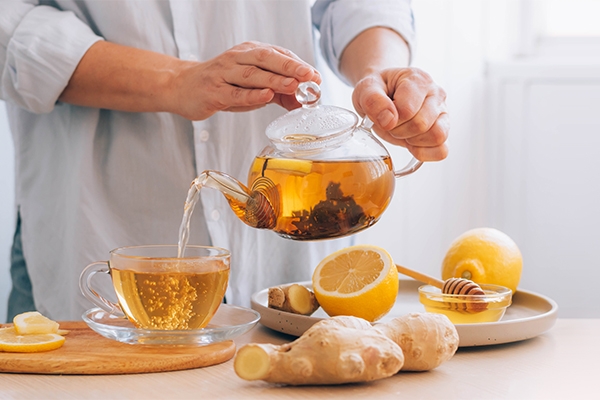Foods to Boost Your Immune System During Flu Season

Unpredictable weather — alternating between heat and rain — can make your body more susceptible to illness. In 2025, Indonesia’s Ministry of Health reported an increase in flu cases across the country. That’s why maintaining a strong immune system is essential to stay healthy during this time.
Flu and respiratory infections on the rise

The flu, or influenza, is an acute respiratory infection caused by influenza viruses type A, B, or C.
Symptoms include fever, cough, runny nose, muscle pain, and fatigue. The virus spreads easily through droplets when an infected person coughs or sneezes.
In addition to influenza, a newer respiratory virus known as Human Metapneumovirus (HMPV) causes flu-like symptoms such as coughing, nasal congestion, and shortness of breath. HMPV can be more serious in children, the elderly, and people with underlying health conditions.
The key to protecting yourself from these viruses is maintaining a strong immune system. Along with vaccination, a well-balanced diet plays a major role in keeping your immune system healthy.
Your body needs adequate energy and nutrients for your immune system to function properly. However, there is no single nutrient, food, or supplement that can make your immunity “super strong” or completely prevent infection.
So, should you change your diet to strengthen your immune system?
Recommended foods to strengthen immunity

The best way to naturally support your immune system is by getting vitamins and minerals from nutrient-rich foods, not just supplements. A balanced diet helps your body fight infection and maintain energy throughout the day.
Follow the “My Plate” principle by filling your plate with a balance of nutrients — carbohydrates, protein, fruits, and vegetables.
Half of your plate should consist of colorful fruits and vegetables packed with vitamins, minerals, and antioxidants.
According to the World Health Organization (WHO), consuming 400–600 grams of fruits and vegetables daily — about 250 grams of vegetables and 150 grams of fruit — is ideal for overall health and immunity.
Here are some nutrient-dense foods to include in your daily meals:
1. Berries
Rich in vitamins and antioxidants that help fight free radicals. Enjoy them in yoghurt, smoothies, or as a healthy low-sugar snack.
2. Fatty fish
Contains omega-3 fatty acids that boost white blood cell activity. Choose salmon, tuna, or mackerel.
3. Leafy green vegetables
Spinach, kale, and mustard greens are packed with vitamin C, antioxidants, and beta-carotene that strengthen your immune system and protect vital organs.
4. Nuts and seeds
Almonds, walnuts, and sunflower seeds contain vitamin B6, magnesium, phosphorus, and selenium — essential for regulating immune function. Perfect as a healthy snack or salad topping.
5. Herbs and spices
Garlic, ginger, and turmeric have natural anti-inflammatory and antibacterial properties that help your body fight infection.
6. Citrus fruits
Excellent sources of vitamin C that boost white blood cell production. Enjoy oranges, lemons, limes, and tangerines fresh or as natural juice.
7. Poultry and chicken soup
According to the National Institutes of Health (NIH), chicken soup can help reduce inflammation, improve hydration, and ease nasal congestion. It also provides vitamin B6 and zinc to aid red blood cell formation and recovery during illness.
8. Bright-colored vegetables
Red bell peppers contain more vitamin C than oranges, while carrots are rich in beta-carotene, which supports immune, eye, and skin health.
9. Yoghurt
A fermented food rich in probiotics and vitamin D that supports gut microbiome balance and strengthens immunity.
10. Olive oil
A healthy fat with antioxidants and anti-inflammatory properties that supports heart health and immune function.
Beyond food: healthy lifestyle habits matter too

Aside from nutrition, maintaining a strong immune system also requires healthy daily habits:
- Get enough quality sleep.
- Exercise regularly — at least 150 minutes per week. Regular physical activity can reduce your risk of catching the flu by 20–30%.
- Manage stress effectively.
- Wash your hands frequently to prevent germ transmission.
- Avoid smoking and limit alcohol consumption.
The best way to protect yourself from the flu is by getting your annual flu vaccination. The vaccine helps your body recognize and fight influenza viruses.
Flu shots are recommended for everyone aged six months and older, including pregnant women — but always consult your doctor first. If you currently have a fever, it’s best to postpone vaccination.
You may experience mild side effects such as headache or nausea after vaccination, which are normal signs that your body is building protection.
Stay Healthy, stay protected.
Take proactive steps to strengthen your immune system today.
Consult our clinic for personalized nutrition and vaccination advice to help your body stay strong — no matter the season.



